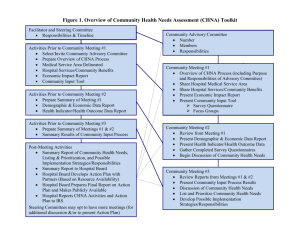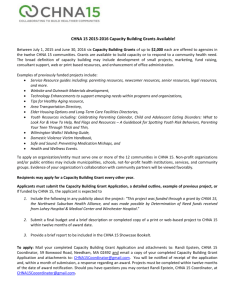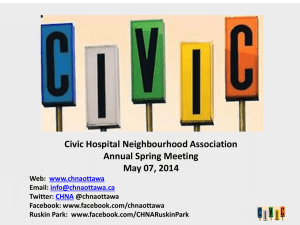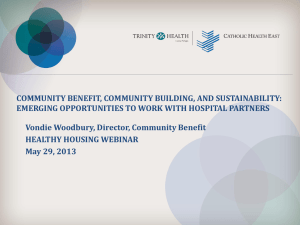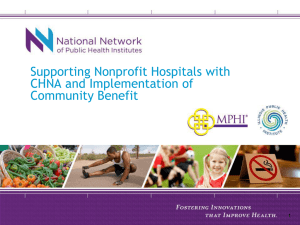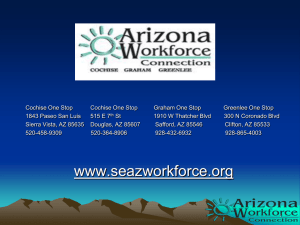Community Health Needs Assessment
advertisement
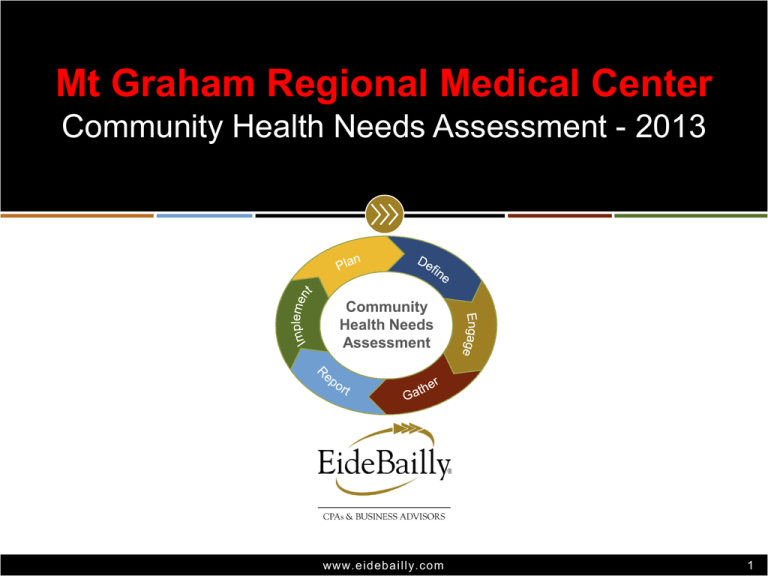
Mt Graham Regional Medical Center Community Health Needs Assessment - 2013 Community Health Needs Assessment www.eidebai lly.com 1 Community Health Needs Assessment CHNA Between September 26, 2012 and July 30, 2013, a Community Health Needs Assessment (CHNA) was conducted by the Graham County Health Dept. and Mt Graham Regional Medical Center (MGRMC) for the approximately 42,000 residents of Graham and Greenlee Counties (Residents of the San Carlos Indian Reservation were not included due to the Indian Health hospitals and clinics that service their population). MGRMC is located in Safford, AZ, which is the county seat for Graham county. Both Graham and Greenlee counties are located in the Southeastern corner of Arizona. MGRMC operates a 49-bed hospital with full Emergency Department, Laboratory, Imaging, General and Orthopedic Surgery, Obstetrics and ICU services. MGRMC also provides a rural health clinic and sleep lab as well as oncology, cardiology and gastroenterology services. www.eidebai lly.com 2 Conducting the Assessment CHNA The information gathering phases of the assessment were initiated and primarily conducted by the Graham County Health Department. The Health Dept. held meetings with community members and formed a survey much like what MGRMC would have done had they completed this process on their own. Following the Health Department’s information gathering process, MGRMC, in collaboration with Eide Bailly LLP an accounting and consulting firm specializing in consulting with healthcare organizations, analyzed the data and formed a committee of community members, many of whom had taken part in the Health Department’s process, to discuss and analyze the data as it pertained to the hospital. www.eidebai lly.com 3 Conducting the Assessment CHNA To ensure input from persons with broad knowledge of the community, individuals representing the educational, civic and nonprofit segments of our community as well as a broad representation from the diverse ethnicities in our community were invited to participate. Representatives from the local health care providers and the county public health department were included to bring in additional professional perspective. Members of the underserved population were not represented directly. However, individuals who specifically serve these populations through government agencies, hospital clinics for the uninsured or underinsured, and non-profit organizations that solely exist to meet the needs of the underserved were invited and did participate so that the issues these individuals face would be addressed. www.eidebai lly.com 4 Conducting the Assessment Community Advisory Committee Participants Individual Position Randy Bryce Jan Davenport Pharmacist Home health provider Director of Nursing-Hospital and Long Lori Burress Term Care Emergency medical services Heather Mack representative Public health officials Laura Rogers/Steve Rutherford (Graham/Greenlee) Chris Gibbs Safford City Mayor Brian Douglas Graham County Disaster Planning Sean Wenham Chamber of Commerce/Freeport Gary Sorenson Community College Dean of Students Dr. Mark Tregaskas Superintendent of Safford Schools Royce Hunt Non-profit organizations/Social Svcs www.eidebai lly.com 5 Conducting the Assessment Community Advisory Committee Participants Individual Position Toni Burress Keith Bryce Craig Smith Dr. Clinton Damron Brenda Adamson Tobacco/Diabetes Education Hospital CFO Counselor/Social Services Physician Nurse Practitioner www.eidebai lly.com 6 Conducting the Assessment CHNA An initial meeting with the Community Advisory Committee was held and the first issue addressed by the Community Advisory Committee was the applicable service area to be considered in determining the community served. www.eidebai lly.com 7 Defining the Community CHNA MGRMC presented information on the community origin of its patients based on admissions from the past year. More than 85% of its patients reside in either Graham or Greenlee county. Based on this information, the committee identified the service areas of Graham County (not to include the San Carlos Indian Reservation due to the fact their healthcare needs are being met by hospitals and clinics provided by Indian Health Services) and Greenlee County for the purposes of the CHNA. www.eidebai lly.com 8 Defining the Service Area CHNA MGRMC is a community-owned hospital and operates under the direction of a Graham County Hospital District Board. Greenlee County has no hospital and is considered part of the MGRMC service area. Those individuals living in Graham County on the San Carlos Indian Reservation are serviced by the Federal Indian Health program and receive their hospital services from the hospital located in San Carlos, AZ. www.eidebai lly.com 9 Community Description Graham and Greenlee counties are predominantly rural areas dominated by agricultural and mining. The 2010 census estimates a population of 37,220 with an average population density of 8.1 residents per square mile in Graham County and a population of 8,437 with an average population density of 4.6 resident per square mile in Greenlee County. MGRMC provides the only inpatient hospital services in the two county service area. The service area population is estimated to have experienced a very slight increase in total population between 2010 and 2012 (1.2%). www.eidebai lly.com 10 Community Description CHNA Median household income in the service area is $43,083 in Graham County and the median household income is $49,390 for Greenlee County. Both counties are below the median income values for both the state of Arizona and the United States. Unemployment rates for the service area range from 8.1% (June, 2013), 5.7% (January, 2008), to 14.5% (July, 2010). These rates compare favorable to the state of Arizona (9.5%) and almost identical to the United States average (8.2%). www.eidebai lly.com 11 Conducting the Assessment CHNA In their initial meeting, the Graham County Health Department (GCHD) community committee reviewed health statistics and data from the Arizona Health Status and Vital Statistics 2010. (http://www.azdhs.gov/plan/report/ahs/ahs2010/toc10.ht m) The review included analysis of health trends and comparisons within the community and with other counties in Arizona. www.eidebai lly.com 12 Conducting the Assessment CHNA The GCHD Community Committee discussed each of the health trends to determine if the information was consistent with their understanding of the needs of the community. This discussion led to the development of a survey tool to gather additional information on the community health needs, as perceived by others not already participating in the Community Committee. www.eidebai lly.com 13 Conducting the Assessment CHNA This survey was then taken to community meetings throughout the service area, advertised in local media and made available in paper form in public health clinics, local businesses, at MGRMC, physician’s clinics and at various civic organizations (Rotary, Lions’ Club). The survey was also available on-line utilizing the SurveyMonkey software and questionnaire tool. A total of 1026 surveys were collected for a total sample size of 2.24% of the population. This total is significantly higher than totals collected in similar volunteer studies conducted by county health departments throughout the state of Arizona throughout 2012. www.eidebai lly.com 14 Conducting the Assessment CHNA The results of the survey were then communicated to the MGRMC Community Advisory Committee. Based on the health needs identified in the review of health data and the results of the GCHD survey, the MGRMC Community Advisory Committee developed a list of 9 potential community needs related directly or indirectly to the hospital. There were no primary and chronic disease or other specific health needs identified related to low income or chronically ill populations. www.eidebai lly.com 15 Potential Health Needs 1. 2. 3. 4. 5. 6. 7. 8. 9. Alcohol and Substance Abuse Mental Health Services Other Specialty Services Teen Pregnancy Abuse or Neglect Obesity Poor Diet Car Seat Safety Basic Understanding of the ACA www.eidebai lly.com 16 Conducting the Assessment CHNA The MGRMC Community Advisory Committee members agreed on a set of criteria to evaluate the list of potential needs identified through the fact finding process. The criteria included: a. b. c. Potential to Impact Community Health Cost to the Community Community Urgency The Community Advisory Committee discussed each of the 9 identified health issues in terms of whether it truly was an issue, the potential health improvement impact, cost and urgency. Committee members then identified 5 of the issues they felt had the highest community priority. This process involved casual group discussion as committee members placed their priority votes on the items, allowing for individuals to make decisions with input from their fellow committee members. www.eidebai lly.com 17 Conducting the Assessment CHNA The prioritization process identified priority issues for the community, presented in rank order: 1. 2. 3. 4. 5. Alcohol and Substance Abuse Mental Health Services Additional Specialty Services Teen Pregnancy Car Seat Safety www.eidebai lly.com 18 Conducting the Assessment CHNA During the discussion on health needs, the Committee identified other resources in the community that may be available to work in collaboration with MGRMC to address the needs identified including: • Schools • Churches/Non-Profits • County Health Department www.eidebai lly.com 19 Community Health Needs Assessment CHNA Next Steps MGRMC is required to adopt an organization specific implementation strategy in response to the Community Health Needs Assessment report. In the coming months, this implementation strategy will be discussed and approved by the Board of Directors of MGRMC, and will be reviewed on an annual basis. The CHNA process and public report will be repeated every three years, as required by federal regulations. www.eidebai lly.com 20 Community Health Needs Assessment CHNA Community Contact Information for CHNA Community members who would like to provide input on the next CHNA process, would like to comment on the needs identified or would like to review detailed community health statistics and data gathered and reviewed by the committee, are encouraged to contact MGRMC with their inquiries, suggestions or comments. CHNA Contact for MGRMC: Ryan Rapier, Director of Public Relations and Marketing 928-348-3748 ryanr@mtgraham.org www.eidebai lly.com 21
